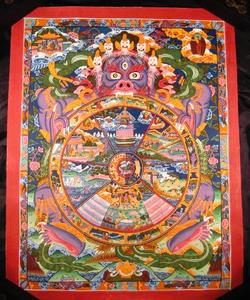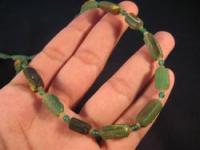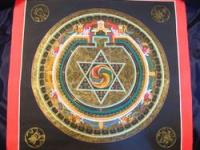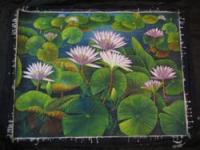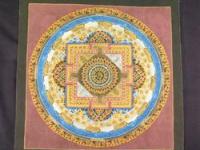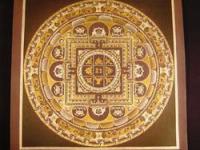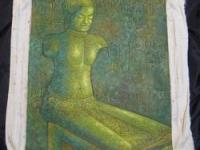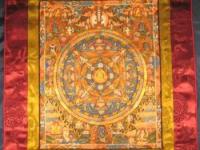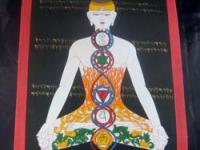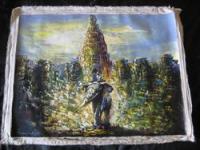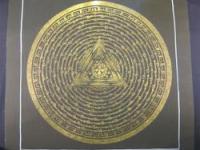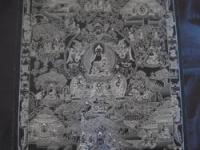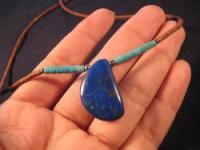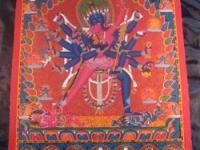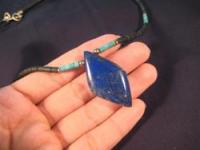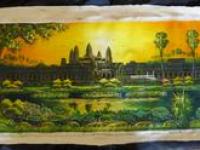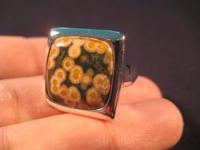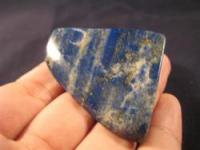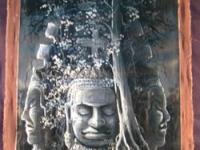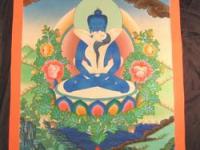This is a beautiful original Wheel of Life Thangka painting that I brought back with me from my last trip to Nepal. I love the purple demon in it and all the character and events in it seem endless. The detail is very good. Real gold paint was used as an accent, a mixed gold paint of 10 to 14 k gold.
Some history of the Wheel of Life:
The Wheel Of Life is also known as the Bhavechakra Mudra or the Wheel Of Transmigration. It depicts the cycles of life, death, and birth or Samsara. The Wheel of Life is like a map or Bible of Karma, Samsara, and Nirvana. It is held in the clutches by a demon representing impermanence. On one hand time is eternal, without beginning or end. On the other this eternity consists of little portions of time that are finite, like human life. In the center the three animals, the bird, the pig and the snake all chase each others tails signifying the vicious cycle that many people many get stuck in as hatred, desire or more specifically evil desire, and ignorance.
In some Wheel of life Thangka paintings there is a dark half of the circle and a light half. Those in the dark half of the circle represent those who have predominately bad karma and descending to one of the three underworlds, and those in the light half with mostly good karma ascending to one of the three positive heavens. The underworld is the kingdom of the animals where one is subjected to beatings and a chance of being eaten. Another underworld is the kingdom of the hungry spirits where inhabitants suffer from non stop hunger as they have minuscule mouths and really thin necks. The third underworld is ruled by the god Yama. He has a scale to weigh out the deeds of the dead. The deeds are usually shown as little balls. Bad deeds have dark colors and good deeds are white. To the left are those who come up short on good karmic merits and to the right are those who have a good chance at a better rebirth. The mirror Yama is holding shows people the truth of their lives. This underworld also shows fires and people being tormented by devils. After death the spirit leaves the body and enters an intermediate world where visions are seen. These visions are both pleasant and terrifying. Ones ability to handle the visions depends on how one lived in his or her earthly existence Lamas and more advanced spirits are better able to figure out for themselves where and how they will be reborn. The positive worlds are the worlds of the giants and demigods. In the top center of the painting it shows the world of the human as being a good departure point for attaining nirvana as humans posses intellect. In the world of the gods a carefree, wonderful life prevails. Here the Buddha denotes the Hindu gods as being subject to karma and samsara just like humans. Even the gods must leave this sanctuary and be reborn if his good merit runs out.
Finally the outer rim contains 12 scenes which represent the various stages or Nidanas man goes through after birth. These pictoral symbols represent different sides of the universal senses. In these twelve segments we can find the:
1. Blind old man. Representing somebody who can not find their way ( Ignorance ).
2.Potter. Shaping matter ( Karma is formed from deeds represented by pots ).
3.Monkey in a tree leaping here and there ( Uncontrollable consciousness ).
4. Two people in a boat ( Separation between the conscious mind and the subconscious mind ).
5. House with five windows and one door ( The five senses and the capacity to think ).
6 . Loving couple ( Contact arising through the senses ).
7.Arrow in eye ( Distinction between pleasant and unpleasant ).
8. Woman handing a man a drink ( Wanting and thirsting for )
9. Picking fruit ( Wanting leads to deeds, sometimes this Nidana is shown as sex ).
10. Bride or pregnant woman ( Couple in bed, becoming, coming into being )
11. Birth ( New life and consciousness ).
12. Dead person being carried away ( At this stage there are two possibilities. Rebirth will take place after a stay in one of the six worlds or extinction will have been attained. Rendered as a Buddha and a Bodhisattva in higher realms ).
In Nepal and Tibet the Wheel Of Life is often painted at the entrances of monasteries. It is the symbol not only of the mystery of evil and stress but of the
teachings of Buddha.
Size: 22" tall and 17.2" wide ( 55.9 cm tall 43.7 cm wide ) including border. 20.2" tall and 15.35" wide ( 51.3 cm tall 39 cm wide ) excluding border
Some history of the Wheel of Life:
The Wheel Of Life is also known as the Bhavechakra Mudra or the Wheel Of Transmigration. It depicts the cycles of life, death, and birth or Samsara. The Wheel of Life is like a map or Bible of Karma, Samsara, and Nirvana. It is held in the clutches by a demon representing impermanence. On one hand time is eternal, without beginning or end. On the other this eternity consists of little portions of time that are finite, like human life. In the center the three animals, the bird, the pig and the snake all chase each others tails signifying the vicious cycle that many people many get stuck in as hatred, desire or more specifically evil desire, and ignorance.
In some Wheel of life Thangka paintings there is a dark half of the circle and a light half. Those in the dark half of the circle represent those who have predominately bad karma and descending to one of the three underworlds, and those in the light half with mostly good karma ascending to one of the three positive heavens. The underworld is the kingdom of the animals where one is subjected to beatings and a chance of being eaten. Another underworld is the kingdom of the hungry spirits where inhabitants suffer from non stop hunger as they have minuscule mouths and really thin necks. The third underworld is ruled by the god Yama. He has a scale to weigh out the deeds of the dead. The deeds are usually shown as little balls. Bad deeds have dark colors and good deeds are white. To the left are those who come up short on good karmic merits and to the right are those who have a good chance at a better rebirth. The mirror Yama is holding shows people the truth of their lives. This underworld also shows fires and people being tormented by devils. After death the spirit leaves the body and enters an intermediate world where visions are seen. These visions are both pleasant and terrifying. Ones ability to handle the visions depends on how one lived in his or her earthly existence Lamas and more advanced spirits are better able to figure out for themselves where and how they will be reborn. The positive worlds are the worlds of the giants and demigods. In the top center of the painting it shows the world of the human as being a good departure point for attaining nirvana as humans posses intellect. In the world of the gods a carefree, wonderful life prevails. Here the Buddha denotes the Hindu gods as being subject to karma and samsara just like humans. Even the gods must leave this sanctuary and be reborn if his good merit runs out.
Finally the outer rim contains 12 scenes which represent the various stages or Nidanas man goes through after birth. These pictoral symbols represent different sides of the universal senses. In these twelve segments we can find the:
1. Blind old man. Representing somebody who can not find their way ( Ignorance ).
2.Potter. Shaping matter ( Karma is formed from deeds represented by pots ).
3.Monkey in a tree leaping here and there ( Uncontrollable consciousness ).
4. Two people in a boat ( Separation between the conscious mind and the subconscious mind ).
5. House with five windows and one door ( The five senses and the capacity to think ).
6 . Loving couple ( Contact arising through the senses ).
7.Arrow in eye ( Distinction between pleasant and unpleasant ).
8. Woman handing a man a drink ( Wanting and thirsting for )
9. Picking fruit ( Wanting leads to deeds, sometimes this Nidana is shown as sex ).
10. Bride or pregnant woman ( Couple in bed, becoming, coming into being )
11. Birth ( New life and consciousness ).
12. Dead person being carried away ( At this stage there are two possibilities. Rebirth will take place after a stay in one of the six worlds or extinction will have been attained. Rendered as a Buddha and a Bodhisattva in higher realms ).
In Nepal and Tibet the Wheel Of Life is often painted at the entrances of monasteries. It is the symbol not only of the mystery of evil and stress but of the
teachings of Buddha.
Size: 22" tall and 17.2" wide ( 55.9 cm tall 43.7 cm wide ) including border. 20.2" tall and 15.35" wide ( 51.3 cm tall 39 cm wide ) excluding border
Payment Methods


Shipping
$10.00
Please Login or Register first before asking a question.
